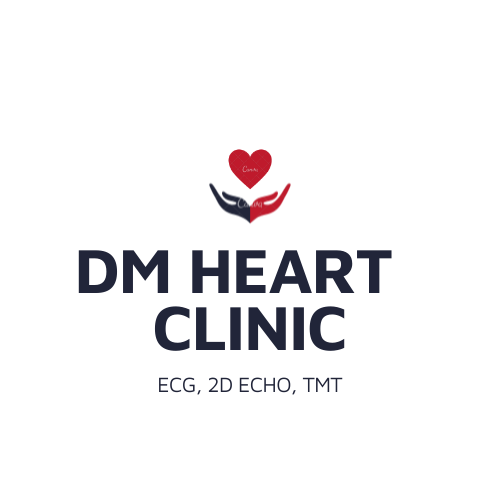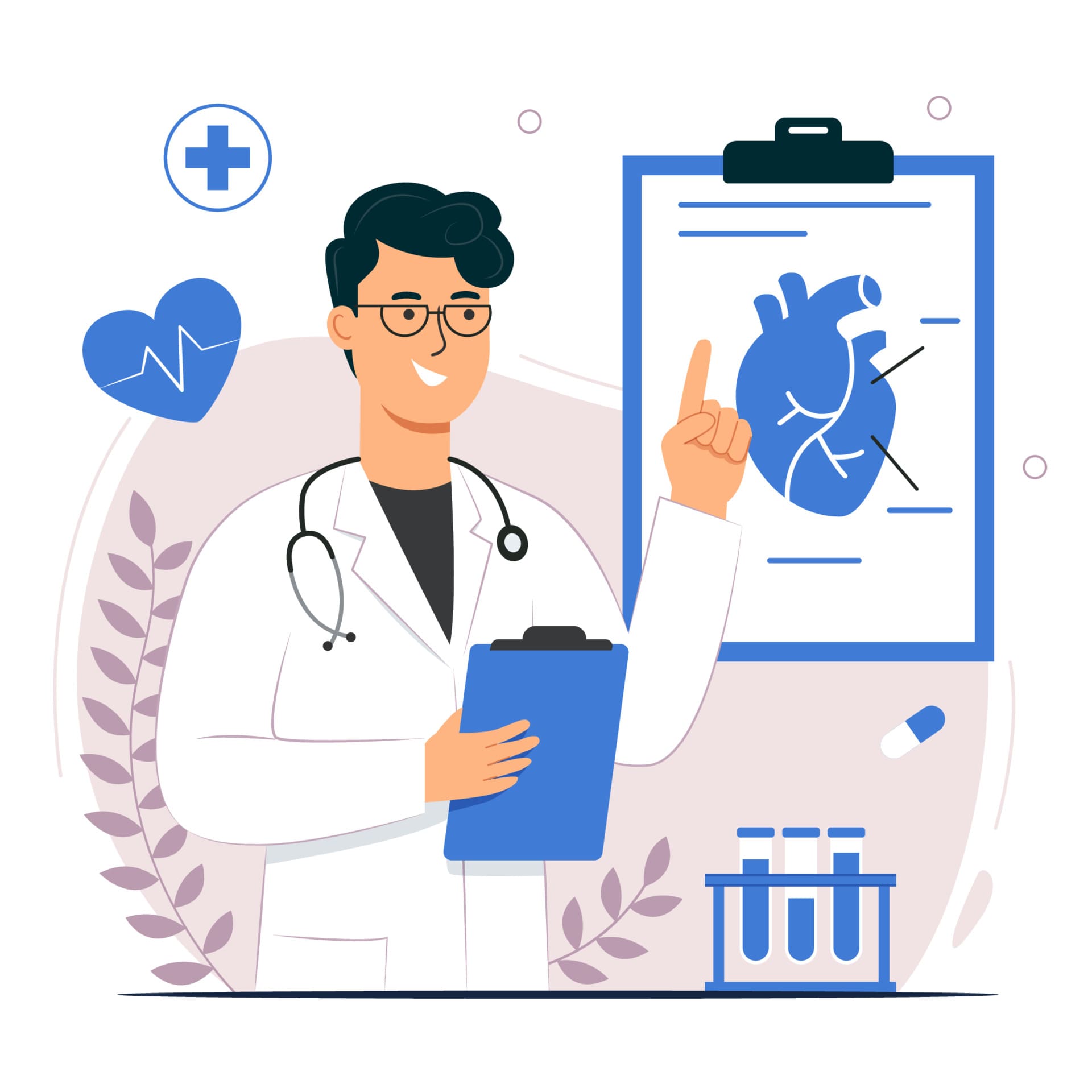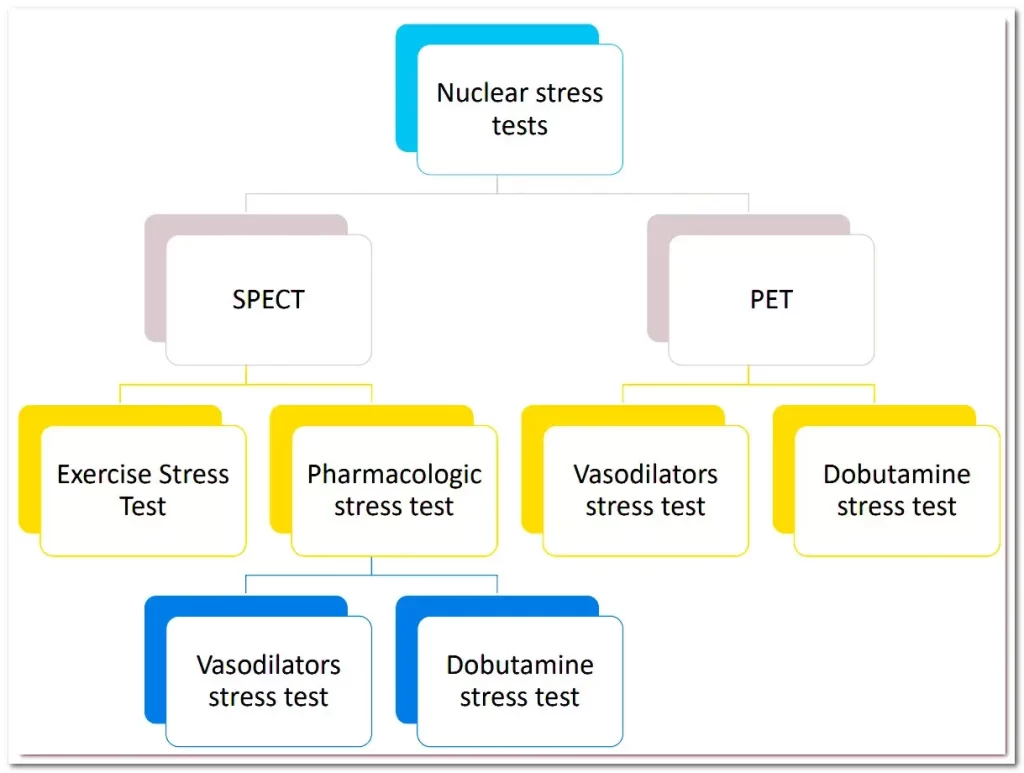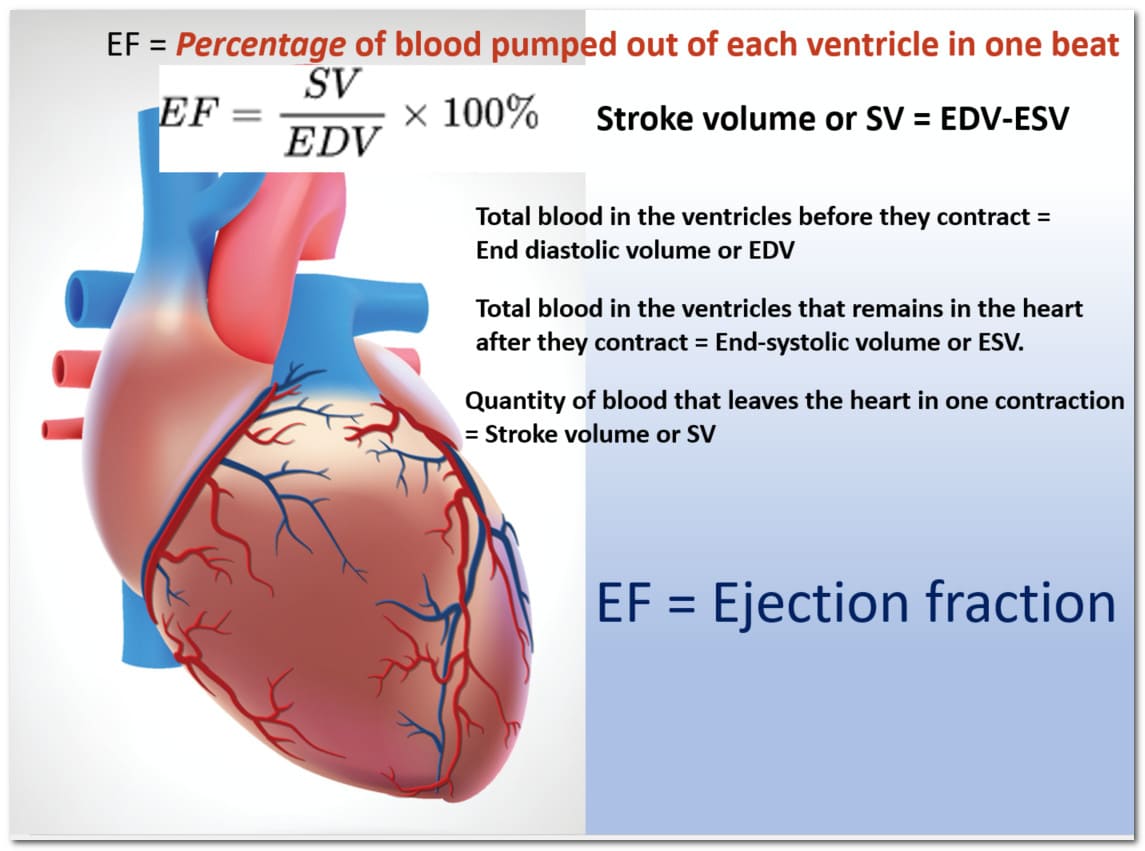Did you know that an annual heart health checkup could save your life?
A heart health checkup is designed to determine if you have any preexisting heart problems and how well your heart functions on a day-to-day basis. There are many ways to test for heart health, and it’s best to know what those tests mean. In addition to knowing the status of your blood pressure, weight, and cholesterol levels, the doctor will want to run a few cardiac tests on your heart.
These cardiac tests may include
- An electrocardiogram (ECG)
- Two-dimensional echocardiogram (2D Echo)
- Treadmill test
- CT calcium score
- CT coronary angiogram
- Lipid profile
- Serum homocysteine
- Lipoprotein A (Lp(a))
- High-sensitivity C-reactive protein or Hs CRP
- Troponin blood test

Heart hospitals or cardiac clinics will have many cardiac check-up packages. You may get confused when choosing the proper heart tests for you. Know about each heart test and decide on the right heart health package.
Ecg and 2d echo can reveal if any damage has been done to your heart and help you avoid severe problems in the future. These are the basic heart tests,
Lipid profile, serum homocysteine, Lipoprotein A (Lp(a)), and ct calcium scores are risk markers for heart disease. They help your cardiologist to assess the future risk of heart disease.
A treadmill test is done to rule out coronary artery disease or CAD. In CAD, the arteries that supply your heart are clogged with cholesterol. Expensive tests like a coronary angiogram can obtain the same information.
A heart health check-up typically includes several tests designed to keep your heart tip-top shape. The right test for your heart depends on your symptoms and risk factors.
Symptoms of heart disease are:
- chest discomfort or left arm pain.
- Heart palpitations.
- Breathing difficulties.
- Dizziness.
- Tiredness.
- Swelling in feet or abdomen.
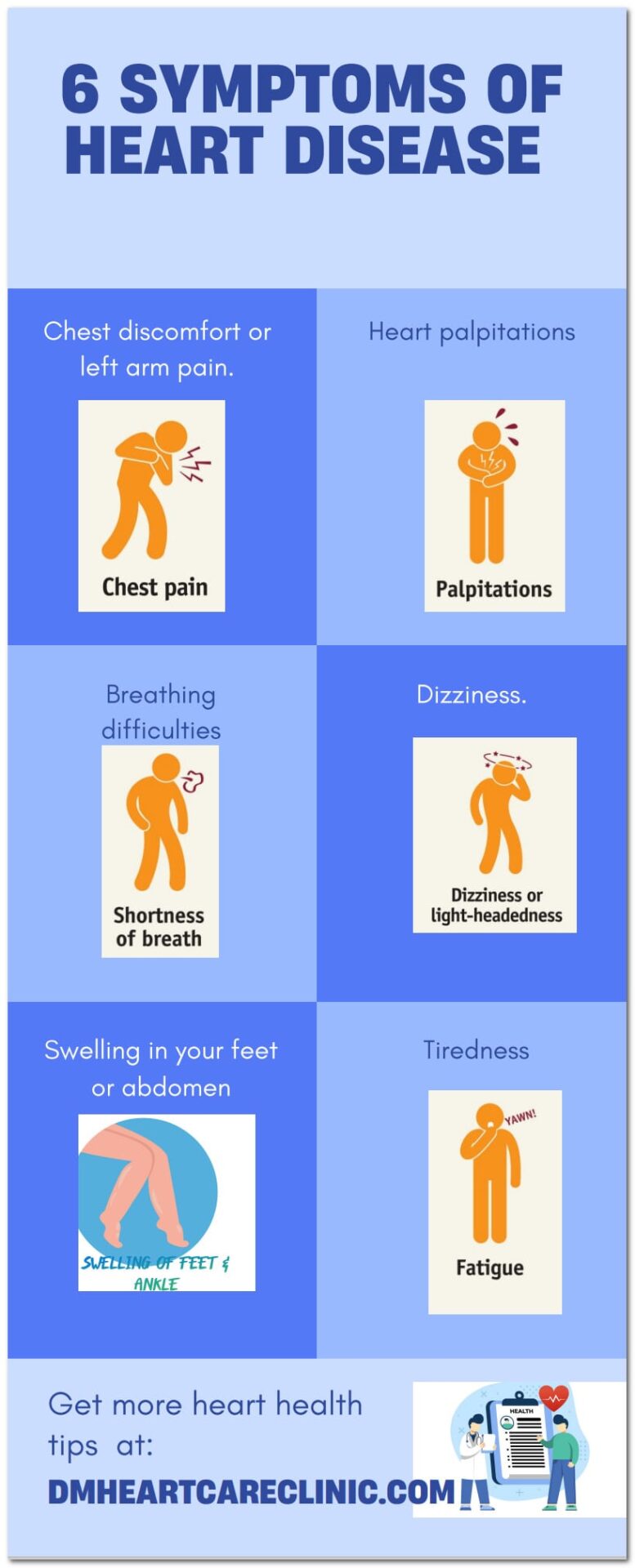
Risk factors for heart diseases
- Elevated blood pressure or hypertension.
- Increased blood cholesterol levels or hyperlipidemia.
- Diabetes mellitus.
- Smoking.
- Age -As you become older, you’re more likely to have damaged and restricted arteries and a weakened or thicker heart muscle.
- Sex. Men are at higher risk of heart disease.
- Family history of premature heart diseases.
- Unhealthy diet.
- Obesity.
If you have any of the above symptoms, you might be having heart disease. Go and get a cardiac health check-up today.
Suppose you do not have any symptoms of heart disease but have risk factors for heart diseases. In that case, get a heart health check-up starting at the age of 20 or even earlier in some situations.
Your heart doctor will probably be the best person to decide on the best heart test and frequency of testing. He may encourage you to get multiple screening tests regularly, depending on your medical history.
Heart tests in the heart health checkup package that can tell you whether you have a heart disease
Following cardiac tests can tell you if you have any heart disease. They can tell (predict) whether you will have heart disease.
- An electrocardiogram (ECG).
- Two-dimensional echocardiogram (2D Echo).
- Treadmill test.
- Troponin blood test.
- CT coronary angiogram.
- Standard coronary angiogram.
Heart tests in the heart health checkup package that can tell you whether you will have a heart disease
Following tests can not tell you if you have any heart disease. But, They can tell [predict) whether you will have a heart disease
- BMI
- Blood pressure
- Lipid profile
- Blood sugar levels
- serum homocysteine
- Lipoprotein A (Lp(a))
- High-sensitivity C-reactive protein or Hs CRP
- CT calcium score
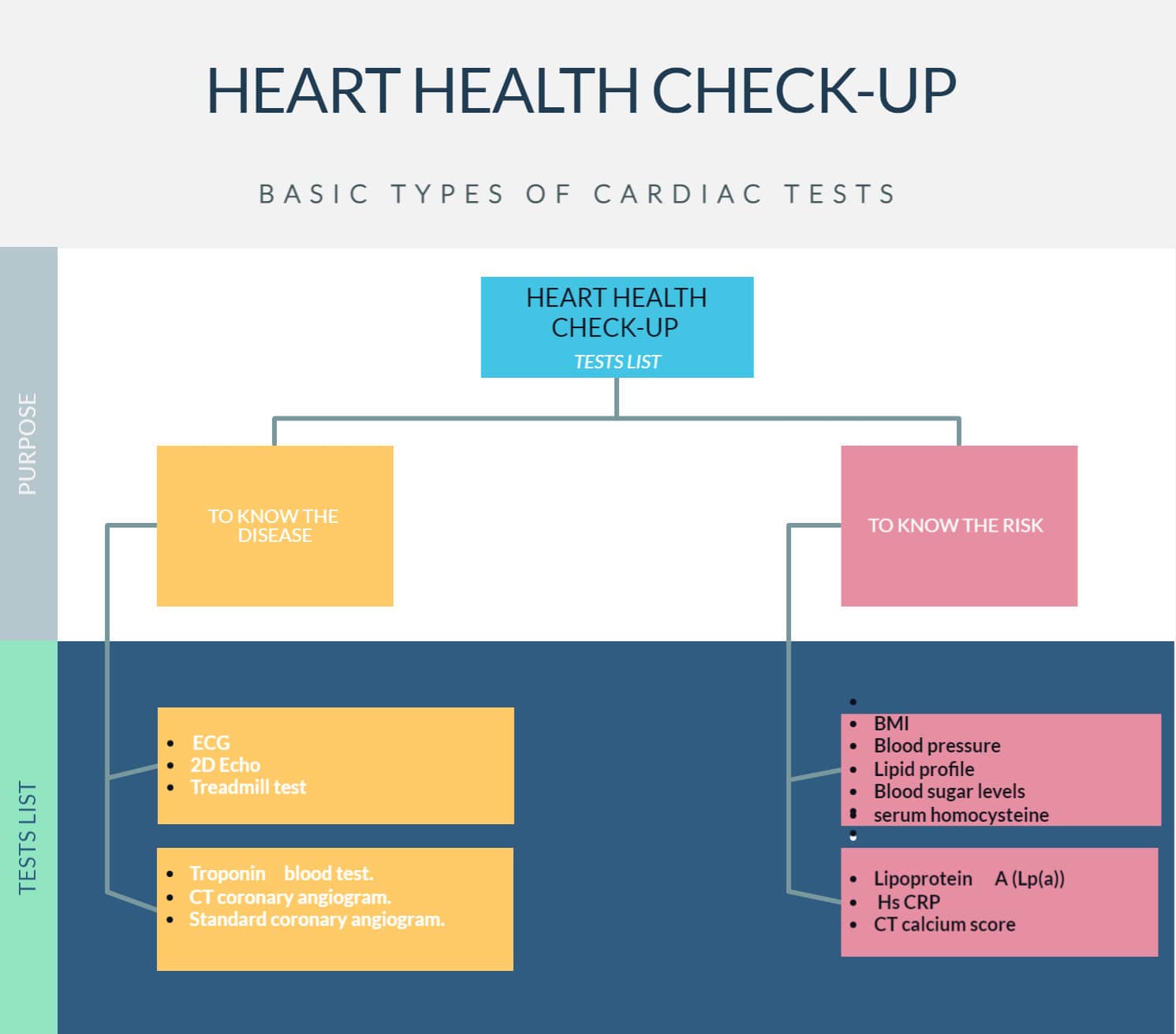
The Essentials of a Heart Health Checkup
Schedule an Appointment
Men over 45, women over 55, and anyone with risk factors such as high blood pressure, diabetes mellitus, or elevated cholesterol levels must have a heart health check-up once every two years. This appointment will include an ECG, an echocardiogram, a lipid panel, a stress test, and other tests.
BMI
- High BMI is linked to heart disease, brain stroke, High blood pressure, high cholesterol, and diabetes.
Suppose your health care provider discovers that your BMI is high or rising. In that case, they can suggest ways to help you avoid becoming overweight or obese. Therefore, A BMI should be checked on most people and children over the age of six at least once a year.
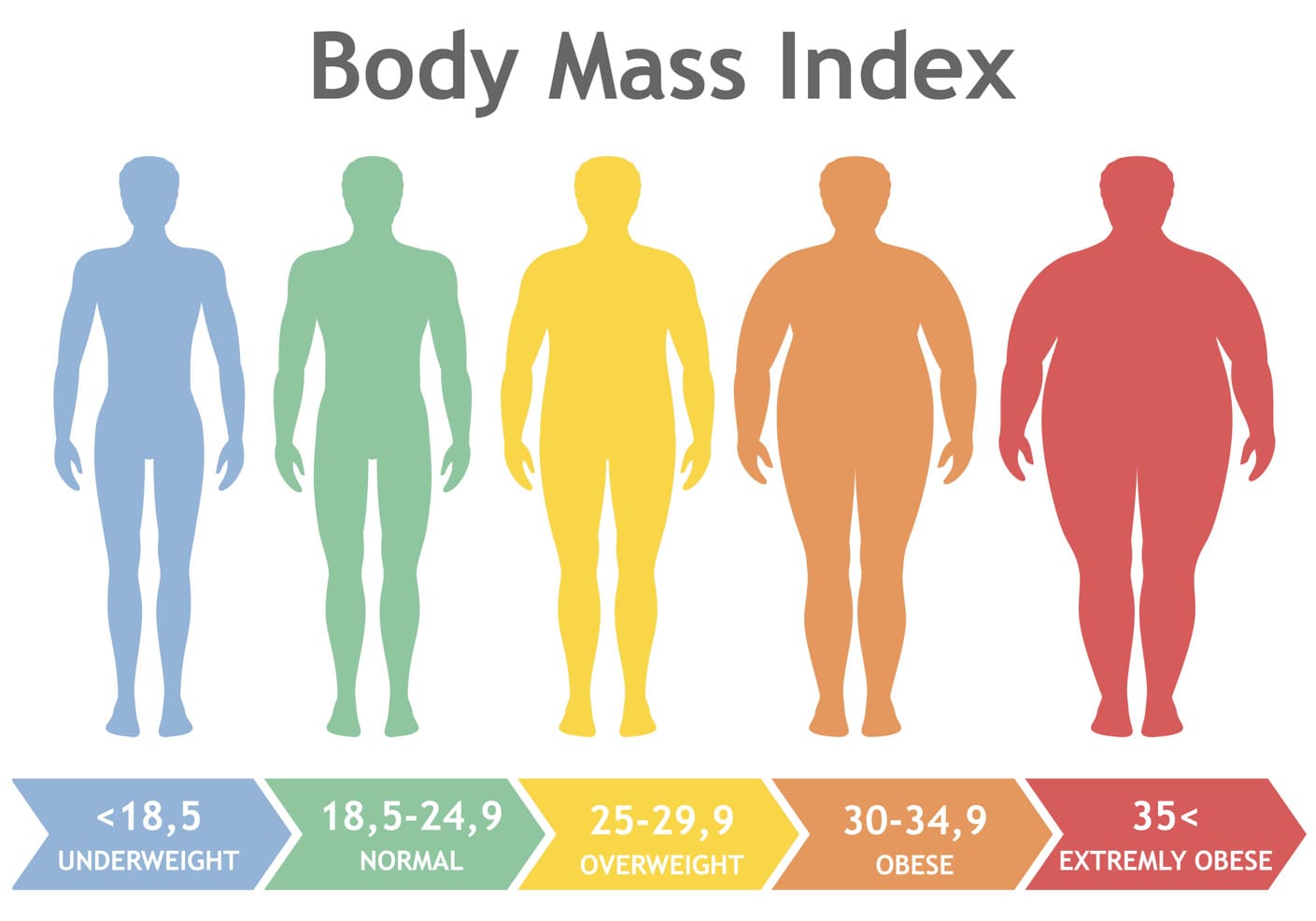
Check Your Blood Pressure
High blood pressure is one of the most common problems. It is responsible for 50 percent of heart attacks. Roughly three out of every four adults have it to some degree. It’s essential to keep your blood pressure in check; an excellent way to do so is by regularly taking your blood pressure at home. Untreated or poorly treated hypertension leads to heart diseases such as thickening of the heart’s wall, heart failure, coronary artery diseases, atrial fibrillation, and heart attack.
Adults with normal blood pressure should get a blood pressure check after one year.
Adults with borderline blood pressure should get a recheck-up for blood pressure after six months.
Adults with confirmed high blood pressure should consult the doctor every three months. If you have high blood pressure, get a heart check-up every six months or one year.
Have Your Cholesterol Tested
If you’re concerned about your heart health, have your cholesterol checked annually. It is a risk marker.
A lipid panel is a blood test to monitor and screen for cardiovascular disease risk. It checks cholesterol levels and triglyceride levels in your blood.
About 40 percent of people globally have abnormal cholesterol levels in their blood. Cholesterol levels in the blood are directly related to the risk of heart attack and brain stroke.
Our recommendation is to get a lipid profile test for the first time for everyone aged more than 21 years who visit a doctor, irrespective of the purpose of the visit.
A lipid profile test is done earlier if the patient wishes to do it to identify his future risk. For patients at high risk (high blood pressure, diabetes, smoking, etc.), it is recommended to do follow-up lipid profile tests between the ages of 25 to 35. The lipid profile test can be repeated after 40 years for patients at low risk.
Your doctor may prescribe you medicines to lower your cholesterol if it is very high. Most importantly, healthy eating habits are crucial when controlling high cholesterol.
Blood sugar levels
Diabetes is probably the most common cause of heart disease. Diabetes raises the heart disease risk by several folds. It is mandatory to check sugar levels immediately if you have symptoms such as increased thirst, increased urination, or weight loss.
Get blood sugar levels if you are older than 45 years, Even if you do not have any symptoms of diabetes.
Even If your age is less than 45 years and you don’t have symptoms, you should get screened for diabetes if you are Overweight or Obese with
- HDL cholesterol is less than 35 or
- Triglycerides more than 250 or
- If your relative has diabetes or
- If you have heart disease or
- If you have high blood pressure
If you are a non-diabetic, you should get your blood sugar levels checked After three years.
If you are prediabetic, get a sugar test Yearly.
If you have diabetes, get HBA1C every three months. You also need to get a heart check-up every six months or one year.
Serum homocysteine test
The serum homocysteine test measures the levels of one amino acid linked to cardiovascular disease. Five to 7 percent of the general population will have elevated blood homocysteine levels. We bother about this elevation as it is often associated with an increased risk of heart attack, brain stroke, and thrombus in leg veins.
Lowering homocysteine levels with vitamin supplementation does not improve future outcomes, so we do not recommend this test. But suppose you have a strong family history of premature heart diseases. In that case, this test helps calculate your risk of a heart attack. It is a risk marker.
Blood Lipoprotein A (Lp(a)) test
Lipoprotein A (Lp(a)) is linked to an increased risk of heart disease. It is a risk marker. Although it’s unnecessary to have lipoprotein A (Lp(a)) tested routinely, ask for it if you have a premature family history of heart disease.
Get an EKG Test
An electrocardiogram (EKG) test is a standard medical test that tests your heart’s electrical activity. To keep your heart healthy, it’s essential to detect and treat any abnormalities before they get worse. An EKG test can catch many issues like heart rhythm abnormalities, enlargement of heart chambers, and heart attack.
High-sensitivity C-reactive protein or Hs CRP blood test
Your C-reactive protein level can be checked with a simple blood test. The hs-CRP test can estimate your risk of coronary artery disease, which is a narrowing of the arteries in your heart. It is again a risk marker of heart disease.
Echocardiogram or 2d echo test
Your doctor may also order an echocardiogram or 2d echo test, which records the structure and function of your heart using sound waves. It is the best way to know the heart’s function with ejection fraction. It checks the condition of 4 valves of the heart. The 2d echo can detect obstruction or leakage of the valves.
Get it when you have symptoms of heart disease or already have heart disease. Your cardiologist advises a 2d echo test if he suspects heart disease in you.
The 2d echocardiogram can see the thickness of the heart wall as well. Increased heart wall thickness increases the risk of future heart attacks or sudden deaths.
A treadmill test or stress EKG test
A treadmill test is a cardiac stress test where you will walk on a treadmill while the treadmill machine continuously monitors your ECG. The test helps diagnose coronary artery disease (CAD).
One crucial advantage of a treadmill test or stress EKG test—it can show if you have plaque buildup in your heart’s arteries.
If you can not walk on a treadmill, do not worry. You have other options as well. Other stress tests to check whether you have CAD with no need to run on a treadmill are
- Dobutamine stress echo
- Nuclear stress test
These are a little expensive and available in a few centers only.
Troponin blood test
The troponin blood test checks your blood sample for the presence of troponin, which can indicate if you have had or are at risk of having heart damage or a heart attack. It can be done as a card test or a laboratory test.
Troponin is mainly used to diagnose and assess the prognosis of acute myocardial infarction (heart attack). Troponin levels get elevated in acute myocardial infarction and persist in the blood for 10 to 14 days.
CT coronary angiogram or CT CAG
A CT coronary angiogram, also known as CT coronary angiogram, is used to diagnose coronary artery disease (CAD). CAD is the narrowing of the arteries that supply oxygen-rich blood to the heart muscle. CT coronary angiogram enables doctors to directly view the inside of the heart and get pictures of the narrowed arteries without inserting a long tube into your body. It is done alternative to a standard coronary angiogram when you have symptoms of coronary artery disease.
A coronary angiogram is a diagnostic imaging test that uses X-rays to create an image of your heart. It allows doctors to see how well your heart is receiving the blood and whether there are any blockages, called stenosis, in any of your coronary arteries.
It is quite expensive and available in a few centers only. It causes radiation. If you have kidney disease, you should not undergo this test.
CT coronary calcium score
The CT coronary calcium score test measures the amount of calcium present in your arteries. A low coronary calcium score on a CT scan can significantly decrease your heart attack or death risk.
A high calcium score indicates that there is a lot of calcified plaque in your coronary arteries. The presence of calcium in the coronary arteries in a patient without symptoms of heart disease is a well-validated risk marker for future cardiac events such as heart attack, sudden death, and brain strokes.
We do coronary calcium scores only in asymptomatic patients.
- Coronary calcium scoring is indicated only in intermediate-risk patients.
- We do not perform Routine CT coronary calcium scans in low or high-risk patients.
- CT coronary calcium scan has no role as a stand-alone test in patients with symptoms of heart disease.
How much do heart checkup packages in Hyderabad cost?
The heart check-up packages typically cost from 1500 to 15000 Indian rupees. The cost of a heart health check-up depends on the type of the hospital or clinic and the number of parameters checked. A basic heart checkup is the most affordable package at DM heart care clinic
Heart checkup tests list in Hyderabad.
A basic heart health check-up comprises of
- Lipid Profile
-
-
-
- Total Cholesterol
- HDL Cholesterol
- LDL cholesterol
- Triglycerides
- Total Cholesterol / HDL Ratio
-
-
- Fasting Blood Sugar
- Serum Creatinine
- BMI
- Blood pressure
- ECG (Resting)
- Echo Cardiogram
- Cardiologist’s Consultation
- Diet counseling
Comprehensive Heart Checkup
- Lipid Profile
-
-
-
- Total Cholesterol
- HDL Cholesterol
- LDL cholesterol
- Triglycerides
- Total Cholesterol / HDL Ratio
-
-
- Blood Sugar levels- Fating, Post-prandial, and HbA1c
- BMI
- Blood pressure
- Serum Creatinine
- ECG (Resting)
- Echocardiogram
- complete blood count
- Complete Urine Examination
- X-Ray chest
- TMT (Treadmill Test)
- Cardiologist’s Consultation
- Diet counseling
Advanced Heart Checkup
- Lipid Profile
-
-
-
- Total Cholesterol
- HDL Cholesterol
- LDL cholesterol
- Triglycerides
- Total Cholesterol / HDL Ratio
-
-
- Blood Sugar levels- Fating, Post-prandial, and HbA1c
- BMI
- Blood pressure
- Serum Creatinine
- complete blood count
- Complete Urine Examination
- X-Ray chest
- ECG or
- 2D Echo
- TMT (Treadmill Test)
- Urea and Uric Acid
- Cardiologist’sConsultation
- Diet counseling
- Serum homocysteine
- serum lipoprotein A
- Hs CRP
Complete Heart Checkup
- Complete Blood Picture
- Blood Sugar levels- Fating, Post-prandial, and HbA1c
- Lipid Profile
-
-
-
- Total Cholesterol
- HDL Cholesterol
- LDL cholesterol
- Triglycerides
- Total Cholesterol / HDL Ratio
-
-
- Serum Creatinine
- X-Ray: Chest PA
- ECG
- 2D Echo
- TMT (Treadmill Test)
- CT ANGIOGRAM and CT calcium score
- Diet counseling
- BMI
- Blood pressure
- Serum homocysteine
- serum lipoprotein A
- Hs CRP
Discuss Your Diet & Exercise Routine during a cardiac health checkup
When you see your cardiologist, do not forget to ask for a piece of advice on exercise and diet. Few heart patients are not supposed to do certain activities. Your cardiologist will tell you the type of exercises you can do.
Dietary changes depend on the type of heart disease and other medical diseases. A dietician gives the best diet chart according to your need.
How to get a heart health checkup package at home
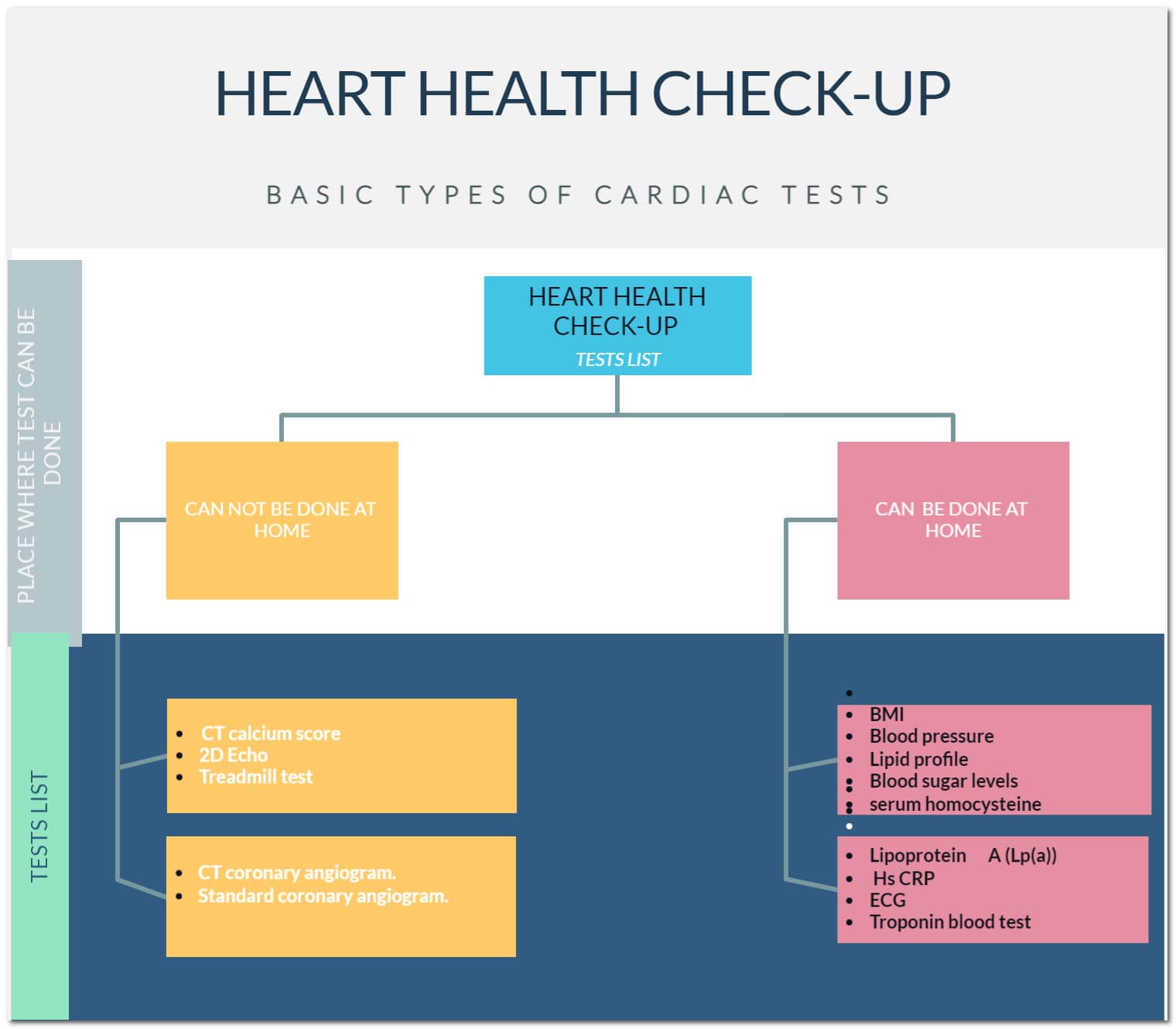
An inexpensive way to monitor heart health at home includes periodically monitoring blood pressure, blood sugar, heart rate, and BMI.
Few heart tests that can be done at home are
- Blood Sugar levels- Fating, Post-prandial, and HbA1c
- Lipid Profile
-
-
-
- Total Cholesterol
- HDL Cholesterol
- LDL cholesterol
- Triglycerides
- Total Cholesterol / HDL Ratio
-
-
- Serum Creatinine
- ECG
- BMI
- Blood pressure
- Serum homocysteine
- serum lipoprotein A
- Hs CRP
- Troponin
The Following tests can not be done at home. So you need to visit a heart clinic or heart hospital.
- X-Ray: Chest PA
- 2D Echo
- TMT (Treadmill Test)
- CT coronary angiogram
- CT calcium score
- Standard coronary angiogram
Know-How To Treat risk factors for heart diseases.
Knowing how to treat risk factors for heart diseases will keep your heart in great shape and health. When you go to your cardiologist for an annual check-up, they will likely ask about blood pressure, cholesterol, and blood sugar levels. Your physician may prescribe a treatment plan or refer you to another professional who can help manage minor issues like high blood pressure, diabetes, or hyperlipidemia.
Take-Home Tips for a cardiac health checkup in Hyderabad
If you’re over 40, now is an excellent time to schedule an appointment with your cardiologist for advice on how to stay healthy. If you haven’t had your cholesterol levels or blood pressure levels checked, get them checked-up at
From there, make these routine changes in your life to keep yourself alive and well, such as
- Eat a heart-healthy diet
- Reduce junk food
- quit smoking
- moderate alcohol intake
- exercise regularly
- Regular heart-health check-ups with a cardiologist
- Maintain recommended weight
- keep HbA1c levels below 7
- maintain blood pressure below 130/80 mm hg
- Keep blood cholesterol under check
Heart health checkup near me in Hyderabad?
DM heart care clinic is the super specialty clinic for all Heart-related diseases. It has a wide variety of cardiac packages that suits your risk profile. Our packages are the most affordable in Hyderabad. Choose one among them that is best suitable for you. It got best heart specialist in Hyderabad
So be sure to schedule your next heart health check-up today! Whether taking a daily blood thinner or cholesterol-lowering drug or following a healthy diet and exercise routine, a regular heart health check-up is essential.
